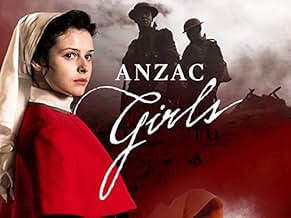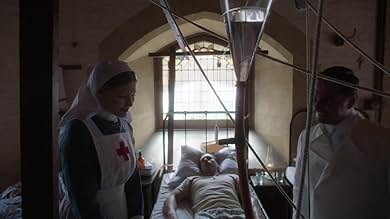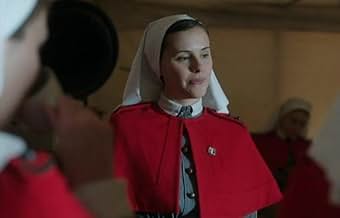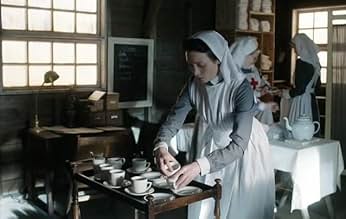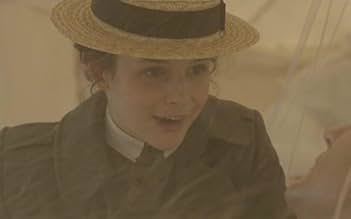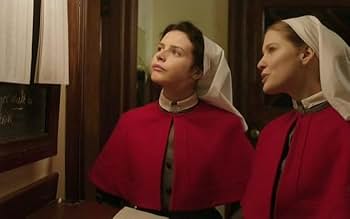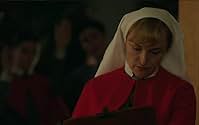Anzac Girls
- Série télévisée
- 2014
- 1h
NOTE IMDb
7,9/10
1,7 k
MA NOTE
Ajouter une intrigue dans votre langueThe true stories of extraordinary young women who witness the brutality and heroism of war and rise to meet the challenge.The true stories of extraordinary young women who witness the brutality and heroism of war and rise to meet the challenge.The true stories of extraordinary young women who witness the brutality and heroism of war and rise to meet the challenge.
- Récompenses
- 3 victoires et 8 nominations au total
Parcourir les épisodes
Avis à la une
We're halfway through the Centennial of 'The Great War', which our President, back then, labeled 'The War To End All Wars'
Modelers like me, all over the world, try to recreate in miniature the technology of World War I. So many new things were introduced: giant dreadnoughts, submarines, gigantic artillery pieces, and tanks. And especially airplanes: the whole world had perhaps a few hundred of them before the war broke out. By the time it ended, over a hundred THOUSAND of them had been made and deployed in every conceivable role.
What's beyond our abilities to recreate: what these great advances in technology were used for. Rolling barrages along hundred-mile fronts; poison gas warfare; unrestricted submarine attacks on every ship on the high seas; total blockades as economic warfare raged among whole huge empires; shelling and bombing of cities far behind the front lines. Something especially new and disastrous: civilians were previously noncombatants as long as they weren't directly in the path of battling armies. But now they could now be shelled and bombed anywhere, even at home hundreds of miles away from any battlefield. Those incredible advances in technology were purchased with rivers of blood shed by millions of people. It's hard for us to even contemplate, much less understand.
But the producers of 'Anzac Girls', and the author of the book on which this series is based, at least try to convey some of this heroism and suffering.
Mobilization of all the resources of all the combatants resulted in unprecedented carnage and consequent large numbers of casualties. So the need for medical services also reached levels never before imaginable.
This miniseries tells the story of five young women from Australia and New Zealand who volunteered for nursing duty with their expeditionary forces. They were young and full of energy and idealism and of course had no clue whatsoever what they were getting themselves into. But who did? Certainly not the fighting men they had to try to put back together, in enormous numbers, after an endless stream of battles. "I'm so sick of this bloody war!" one of the nurses blurts out, after yet another man under her care succumbs to his wounds despite her best efforts. And this is 1916. We viewers knew there were still two years to go participants in the Great War must have thought it would never end.
These episodes are mostly drama, with a little romance creeping in here and there. With youthful hormones running in such emotionally-charged conditions, how could there not be? But the budding attachments are just as fragile as the forward tent-housed 'hospitals' the Anzac girls work at, and the war wrecks everything indiscriminately. Some of the wrecking is just psychological: strain and burnout and personal loss and trauma. But some of it is flaming physical fury: there are several horrific scenes within these episodes. One occurs at a forward casualty station. When the nurses arrive, the camp commander reassures them that the railroad marshalling yard – a legitimate military target—is easily more than a hundred yards away! A night bombing raid—with big German bombers fleetingly, terrifying visible directly overhead—show how insignificant that separation is. While cringing at the scene, you can't help but make the connection to the 'Doctors Without Borders' trying to cope with the multitude of wars we have nowadays. Each may be small compared to the Great War, but there are so many of them, and the medical personnel get bombed, along with their patients, just like back then Over the course of the series, the nurses move around: from a decent hospital in Cairo, to an unequipped island near the Gallipoli invasion, later to the Western Front, near the Somme River valley. Watching their skilled perseverance, as they actually save large numbers of men who would certainly have died otherwise, is inspiring enough. Watching them exhibit physical and moral courage in the midst of catastrophes is almost beyond belief.
This miniseries can't be said to be enjoyable, but it's certainly well done. All the production values are high. My wife Sandy and I watch lots of dramas on PBS, but have never before seen any members of the cast of 'Anzac Girls'. It's produced with the cooperation of the national film boards of Australia and New Zealand, however, so the actors and actresses may be experienced players in the film industry there. In any case, everyone does a fine workmanlike job of portraying the drama and trauma of serving in 'The War To End All Wars'.
What's beyond our abilities to recreate: what these great advances in technology were used for. Rolling barrages along hundred-mile fronts; poison gas warfare; unrestricted submarine attacks on every ship on the high seas; total blockades as economic warfare raged among whole huge empires; shelling and bombing of cities far behind the front lines. Something especially new and disastrous: civilians were previously noncombatants as long as they weren't directly in the path of battling armies. But now they could now be shelled and bombed anywhere, even at home hundreds of miles away from any battlefield. Those incredible advances in technology were purchased with rivers of blood shed by millions of people. It's hard for us to even contemplate, much less understand.
But the producers of 'Anzac Girls', and the author of the book on which this series is based, at least try to convey some of this heroism and suffering.
Mobilization of all the resources of all the combatants resulted in unprecedented carnage and consequent large numbers of casualties. So the need for medical services also reached levels never before imaginable.
This miniseries tells the story of five young women from Australia and New Zealand who volunteered for nursing duty with their expeditionary forces. They were young and full of energy and idealism and of course had no clue whatsoever what they were getting themselves into. But who did? Certainly not the fighting men they had to try to put back together, in enormous numbers, after an endless stream of battles. "I'm so sick of this bloody war!" one of the nurses blurts out, after yet another man under her care succumbs to his wounds despite her best efforts. And this is 1916. We viewers knew there were still two years to go participants in the Great War must have thought it would never end.
These episodes are mostly drama, with a little romance creeping in here and there. With youthful hormones running in such emotionally-charged conditions, how could there not be? But the budding attachments are just as fragile as the forward tent-housed 'hospitals' the Anzac girls work at, and the war wrecks everything indiscriminately. Some of the wrecking is just psychological: strain and burnout and personal loss and trauma. But some of it is flaming physical fury: there are several horrific scenes within these episodes. One occurs at a forward casualty station. When the nurses arrive, the camp commander reassures them that the railroad marshalling yard – a legitimate military target—is easily more than a hundred yards away! A night bombing raid—with big German bombers fleetingly, terrifying visible directly overhead—show how insignificant that separation is. While cringing at the scene, you can't help but make the connection to the 'Doctors Without Borders' trying to cope with the multitude of wars we have nowadays. Each may be small compared to the Great War, but there are so many of them, and the medical personnel get bombed, along with their patients, just like back then Over the course of the series, the nurses move around: from a decent hospital in Cairo, to an unequipped island near the Gallipoli invasion, later to the Western Front, near the Somme River valley. Watching their skilled perseverance, as they actually save large numbers of men who would certainly have died otherwise, is inspiring enough. Watching them exhibit physical and moral courage in the midst of catastrophes is almost beyond belief.
This miniseries can't be said to be enjoyable, but it's certainly well done. All the production values are high. My wife Sandy and I watch lots of dramas on PBS, but have never before seen any members of the cast of 'Anzac Girls'. It's produced with the cooperation of the national film boards of Australia and New Zealand, however, so the actors and actresses may be experienced players in the film industry there. In any case, everyone does a fine workmanlike job of portraying the drama and trauma of serving in 'The War To End All Wars'.
A number of the reviews here have taken issue with the nurses flirting etc in the early episodes. I don't see this as being inconsistent with their roles, most of these were young women in their early twenties many of them away from home for the first time. These were the girls that would have left fairly repressive by todays standards home so the fact they may have been interested in the blokes isn't really a surprise. As the series went on all of the characters got more sad and wise as anyone in that situation would. The book The Other Anzacs is a very good read and this show follows it fairly faithfully.
I think this is worth a look if nothing else for the way Nurse Alice Ross King gives the VD lecture.
I think this is worth a look if nothing else for the way Nurse Alice Ross King gives the VD lecture.
I loved this series and didn't want it to end (not the war, I was well ready for it to end, but not the acquaintances with these phenomenal women). This series is brilliantly told and performed. It is the story of five real women who served the Australian and New Zealand war effort as nurses, researched through their journals and letters, at the time. The actors fully embody their characters and win our hearts. From the fledgling excitement of their new postings to the decent into the midst of the horrors of war, their tales are told. Greg Haddrick, Executive Producer, summed up this 6 hour limited TV series rather nicely, "...after watching it you have experienced the pointlessness of war and are left with a feeling that human compassion and decency toward each other is more important than many other things in life." I can't speak highly enough of this production, it just did everything right. I give it a 10 (brilliant) out of 10. {Historical War Drama}
Having had two great uncles fought in World War 1, and having a great grandmother who was a nurse in France, I have to say my anticipation was not disappointed. These young actors were superb portraying the young soldiers and nurses from that war. The script is amazing. The story moves at a good pace without any boring bits.
I wanted to correct some of the misconceptions that have been expressed here. Someone mentioned the nurses flirting with the soldiers. Really, of course they would have. They were teenagers and young men and women and healthy ones at that with all the hormones of any young healthy generation. Of course they were Bible trained with good morals but temptation was always going to be a problem for them in a foreign country.
And as far as the language was concerned. I knew these people as the older generation in my life and they spoke just like that. I felt like I was watching them as youngsters. The cast did such a good job of convincing the audience that they were from a past age. I also love the way Harry read poetry. That was a great pastime for people of that time who often recited poetry as a form of entertainment to others. There was no tv or radio then. I loved this series. I think it was spot on and everyone should watch it as at least to learn about a historical bunch of brave young people facing one of the world's greatest catastrophes, the First World War. Watch it. You might just learn something about courage and perseverence. I did.
I wanted to correct some of the misconceptions that have been expressed here. Someone mentioned the nurses flirting with the soldiers. Really, of course they would have. They were teenagers and young men and women and healthy ones at that with all the hormones of any young healthy generation. Of course they were Bible trained with good morals but temptation was always going to be a problem for them in a foreign country.
And as far as the language was concerned. I knew these people as the older generation in my life and they spoke just like that. I felt like I was watching them as youngsters. The cast did such a good job of convincing the audience that they were from a past age. I also love the way Harry read poetry. That was a great pastime for people of that time who often recited poetry as a form of entertainment to others. There was no tv or radio then. I loved this series. I think it was spot on and everyone should watch it as at least to learn about a historical bunch of brave young people facing one of the world's greatest catastrophes, the First World War. Watch it. You might just learn something about courage and perseverence. I did.
I just loved this series and watched it in one go, I have been telling everyone about it!!!! There are some pretty gruesome scenes of wounds, but that's what happened. I had no idea how many women were involved in WW1, what a culture shock it would have been for anyone, but women who had been sheltered as they would have been must have struggled. One thing is for sure though, they were tougher that I would be, NO WAY could I have done what they did. It humbled me, we don't appreciate how lucky we are. So my final words - watch it, beautifully written and filmed.
Le saviez-vous
- AnecdotesThis is based on the Australian and New Zealand Army Nursing Service. They were truly ANZAC's. They paved the way for the Royal Australian Army Nursing Corps.
- ConnexionsFeatured in The Making of ANZAC Girls (2014)
Meilleurs choix
Connectez-vous pour évaluer et suivre la liste de favoris afin de recevoir des recommandations personnalisées
- How many seasons does Anzac Girls have?Alimenté par Alexa
Détails
- Date de sortie
- Pays d’origine
- Sites officiels
- Langue
- Aussi connu sous le nom de
- Девушки из Анзак
- Lieux de tournage
- Sociétés de production
- Voir plus de crédits d'entreprise sur IMDbPro
Contribuer à cette page
Suggérer une modification ou ajouter du contenu manquant

Lacune principale
By what name was Anzac Girls (2014) officially released in India in English?
Répondre

